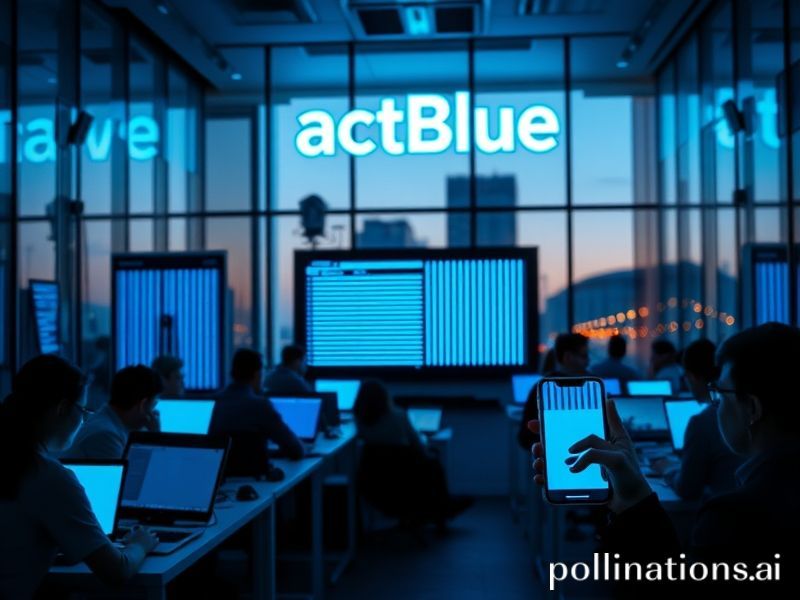ActBlue Goes Global: How American Panic-Donations Became the World’s New Favorite Guilt Purchase
ActBlue and the Global Democratization of Panic-Donating
By Our Correspondent, Still Jet-lagged in Three Time Zones
PARIS—If you’ve ever wondered what would happen if an ATM and a guilt trip had a baby, meet ActBlue. The little blue engine that could—and did—hoover up $14 billion for U.S. Democrats since 2004 is no longer a quaint American peculiarity like deep-fried butter or congressional fistfights. It has quietly become the Starbucks of online political caffeine: everywhere, unavoidable, and responsible for far too many sleepless nights.
The premise is charmingly simple: give anyone with Wi-Fi and a credit card the power to turn outrage into micro-donations faster than you can say “democracy is on the ballot.” Abroad, this registers as either inspirational or tragicomic, depending on whether your own elections are decided by military coups or by whichever cousin the king likes best.
In Kenya, activists watch ActBlue’s dashboards the way commodities traders watch pork-belly futures—except the commodity here is existential dread. When a U.S. Senate race tightens, M-Pesa money-movers in Nairobi feel the aftershock; diaspora remittances dip because Uncle Sam in Minnesota just drained the family WhatsApp group to save “our last firewall against fascism.” Meanwhile, in Warsaw, Polish liberals sigh: if only we could crowdfund judicial independence with the same efficiency Americans use to rescue geriatric incumbents from their own talking points.
The secret sauce is not tech wizardry; it’s weaponized FOMO. A single apocalyptic email subject line (“We’re 94% to goal, Karen”) triggers a Pavlovian cascade from Stockholm to Seoul. Swedes, who already pay taxes that could fund a small moon mission, still Venmo ten bucks to a swing-district candidate whose name they can’t pronounce. The transaction feels like buying a carbon offset, except the planet being saved is a 250-year-old experiment in self-government, not the literal planet.
Critics, naturally, call it the “financialization of doom.” They argue ActBlue has gamified civic duty into a loot box that mostly drops campaign stickers and existential angst. But the same accusation could be lobbed at K-pop stans streaming their idols into record charts, or at crypto bros minting JPEGs of bored apes. At least ActBlue’s NFTs—Non-Fungible Turnout—occasionally flip a legislature.
There is, of course, the darker footnote: every dollar zipping through ActBlue’s servers is another data point confirming that political hope now travels exclusively by credit card. In Manila, a Philippine senate candidate dreams of replicating the platform, only to discover that local banks still treat online donations with the suspicion usually reserved for pyramid schemes involving herbal toothpaste. In Delhi, the ruling party’s app—helpfully called NaMo—copies the interface but swaps dread for devotional memes. The takeaway? Globalization no longer exports democracy; it exports the donation button.
And then there’s the foreign-policy butterfly effect. ActBlue-fueled congressional majorities write climate bills that determine whether Bangladesh exists in 2100. A last-minute surge for a Nevada secretary of state candidate can decide whether next year’s global summit on election integrity is held in Geneva or in a Marriott near the Vegas airport. The world watches American yard signs the way previous generations watched missile silos.
So, is ActBlue a triumph of participatory democracy or merely GoFundMe for the end times? Yes. It is both the fire alarm and the fire sale, a platform where the global middle class can purchase a sliver of influence in the empire that still, for better or worse, runs the air-conditioning on Spaceship Earth.
As the 2024 cycle revs up, expect international observers to refresh the ActBlue ticker with the same morbid curiosity they once reserved for the Doomsday Clock. The page loads, the numbers climb, and somewhere a Belgian retiree wonders if her €5 recurring donation will keep the U.S. Supreme Court from outlawing solar panels. It won’t, but at least she’ll get a sticker.
And that, dear reader, is the most honest transaction in politics: a small rectangle of vinyl that says “I tried,” mailed across an ocean by an algorithm that knows your ZIP code better than your own mother.







